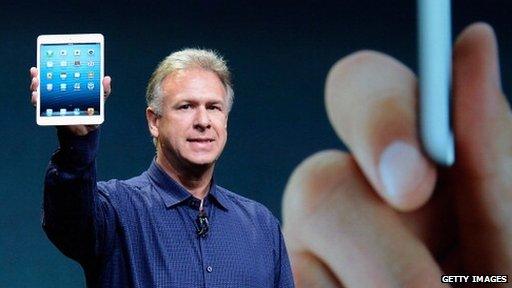Tablets take centre stage
- Published
- comments

In a hectic year, the tectonic plates of technology are shifting again. In the space of a few days, three giants of this industry - Apple, Microsoft and Google - are holding major product launches, and it is tablets which are centre stage.
Apple kicked things off last night with what had been billed the iPad mini event, but turned out to be a rather larger scale "refresh" of the range than expected, with updated desktop and laptop computers, and a fourth version of the full-size iPad.
One notable feature was that both the MacBook Pro and the new iMac came without a DVD/CD drive. Apple has decided that, in the days of pulling your content down from the cloud, physical media have had their day - whether you like it or not.
There will be grumbling, but I suspect its instincts are correct.
However, it was the iPad mini which was the main course, the only product that was really new - if you count becoming smaller as a real leap forward.
"There is nothing as amazing as this!" declaimed the marketing chief Phil Schiller with typical understatement.
That said, the iPad must count as one of the most groundbreaking innovations of recent years. Apple's Tim Cook boasted that 100 million had been sold in just two and a half years, and the tablet was now outselling not just every PC, but the entire range of any PC-maker.
That is some shift in consumer behaviour in a short period - and as we know other companies have rushed to imitate the iPad, though with limited impact on its market share.
The most successful rivals have been the 7in (17.8cm) Android tablets - in particular the Google Nexus and the Kindle Fire. They have combined decent performance with very keen pricing - but their biggest success has been in provoking Apple to change its mind.
For Steve Jobs insisted that 10in (25.4cm) was the minimum size for a tablet. He was talking about the screen size necessary to display useful apps but he may have also had in mind the juicy margins Apple was getting on the bigger device.
There were big dangers for the company in pricing the iPad mini - make it too cheap and it could cannibalise the lucrative sales of its big brother, too expensive and it could flop against the competition from Google and Amazon.
Before we got to the price, Phil Schiller launched a pretty direct attack on a rival device. Placing a picture of the Google Nexus 7 alongside the iPad mini, he went through their specifications - the iPad's screen size was not so mini, 30% bigger than the Nexus, the overall experience on one was "great", on the other "not so great".
Ah, but when we got to the price, it was clear you paid for that extra real estate. It starts at £269 for the 16GB version, compared to £199 for the Google Nexus, with Amazon's Kindle Fire HD even cheaper at £159.
That looks expensive - but we mustn't underestimate the sheer power of the iPad brand. Apple says 90% of all web traffic from a tablet is from an iPad right now - and those hundred million users out there surfing on trains and in cafes are a great marketing resource for the mini. I'm sure it will sell well to people who wanted but couldn't quite afford the full-size version - the big question is whether that comes at the expense of the new fourth generation iPad.
And there's more competition about to arrive. The Surface - the new tablet from Microsoft - is on sale on Friday. More on this later, but it looks quite an impressive addition to the high-end professional end of the market. And then next Monday Google holds an Android event, with talk of a 10in Nexus.
Tablets, big and small, are crowding out the PC, with sales of personal computers down 8% on a year ago. In 2010 when the iPad was launched many mocked it as a plaything - but Apple, Google and even Microsoft believe the future of their industry is tablet-shaped, so getting the right offer in front of consumers is a very serious business.